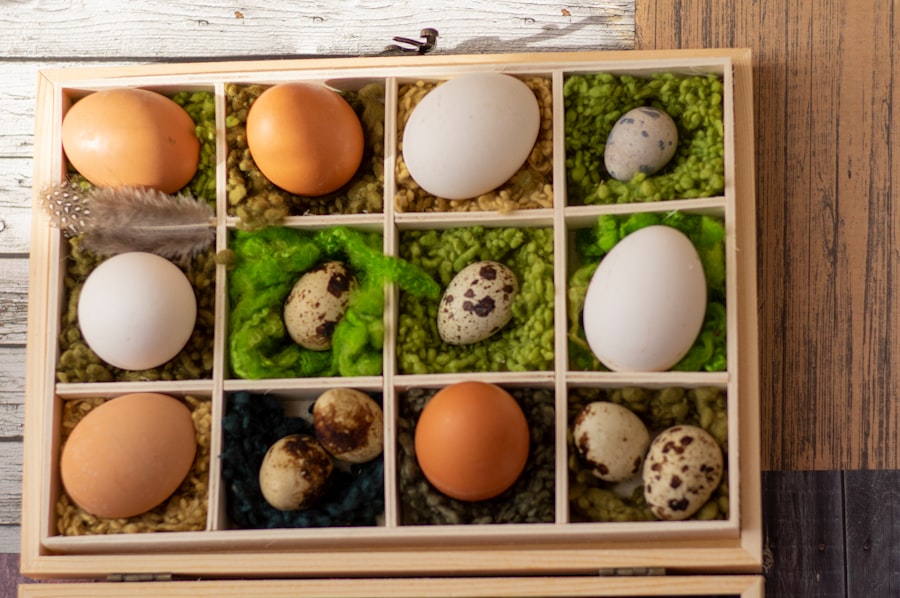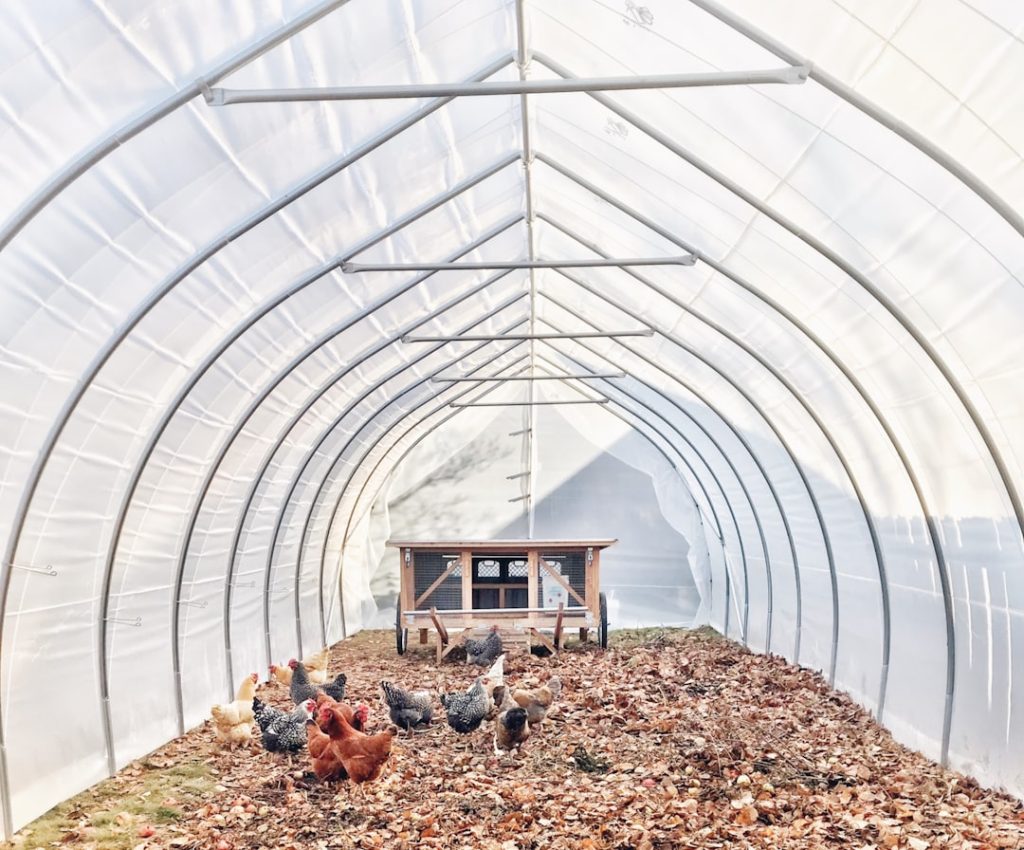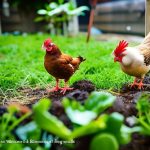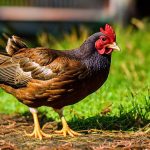Chickens are known for their vocal nature, and squawking is a common form of communication among them. There are several reasons why chickens may squawk, and understanding these reasons is crucial for providing proper care for them. One common reason for squawking is to alert the flock of potential danger.
Chickens have a strong instinct to protect themselves and their flock, so they will often squawk loudly to warn others of a perceived threat. This could be anything from a predator in the area to a sudden loud noise that startles them. Another reason for squawking is to establish a pecking order within the flock.
Chickens have a complex social structure, and squawking can be a way for them to assert their dominance or communicate with other members of the flock. Additionally, chickens may squawk when they are in pain or distress. This could be due to an injury, illness, or discomfort, and it’s important to pay attention to the frequency and intensity of their squawking to determine if there is an underlying issue that needs to be addressed.
Furthermore, chickens may also squawk as a form of communication with their human caretakers. They may squawk when they are hungry, thirsty, or in need of attention. It’s important for chicken owners to pay attention to the context of the squawking and respond accordingly to ensure the well-being of their feathered friends.
By understanding the reasons behind chicken squawking, caretakers can better meet the needs of their chickens and provide a suitable environment that promotes their overall health and happiness.
Table of Contents
- 1 Providing a suitable environment for chickens
- 2 Ensuring a balanced diet for chickens
- 3 Minimizing stress and anxiety in chickens
- 4 Implementing noise-reducing measures
- 5 Utilizing distractions and enrichment activities
- 6 Seeking professional advice if necessary
- 7 FAQs
- 7.1 What causes chickens to squawk during the day?
- 7.2 How can I keep chickens from squawking during the day?
- 7.3 What are some effective ways to reduce chicken squawking during the day?
- 7.4 Are there any natural remedies to keep chickens from squawking during the day?
- 7.5 When should I be concerned about excessive squawking from my chickens during the day?
Key Takeaways
- Chicken squawking can be caused by various reasons such as predators, discomfort, or communication with other chickens
- Providing a suitable environment for chickens includes ensuring proper space, ventilation, and protection from predators
- A balanced diet for chickens should include a mix of grains, protein, and essential nutrients
- Minimizing stress and anxiety in chickens can be achieved through regular handling, avoiding overcrowding, and maintaining a clean coop
- Implementing noise-reducing measures such as soundproofing the coop or using white noise machines can help calm chickens
- Distractions and enrichment activities like hanging treats or providing toys can keep chickens engaged and reduce squawking
- Seeking professional advice from a veterinarian or animal behaviorist can be beneficial in addressing persistent squawking issues
Providing a suitable environment for chickens
Providing a Safe and Healthy Coop
Creating a suitable environment for chickens is essential for their well-being and can help minimize excessive squawking. First and foremost, chickens need a safe and secure coop that protects them from predators and the elements. The coop should be spacious enough to allow for natural behaviors such as roosting and nesting, and it should be kept clean and well-ventilated to prevent the buildup of ammonia and other harmful substances.
Ensuring Adequate Space and Freedom
Additionally, providing ample space for chickens to roam and forage is important for their physical and mental health. This can be achieved through a well-designed outdoor run or by allowing chickens to free-range in a safe and supervised area. Furthermore, providing appropriate roosting bars, nesting boxes, and dust bathing areas can help fulfill their natural instincts and reduce stress.
Meeting Their Basic Needs
Access to fresh water and a balanced diet is also crucial for maintaining their overall health and minimizing squawking. By creating a suitable environment that meets the physical and behavioral needs of chickens, caretakers can help reduce stress and promote a more peaceful and contented flock.
Ensuring a balanced diet for chickens

A balanced diet is essential for the health and well-being of chickens, and it can play a significant role in minimizing excessive squawking. Chickens require a diet that is rich in essential nutrients such as protein, vitamins, minerals, and fiber to support their growth, egg production, and overall health. A good quality commercial feed formulated specifically for chickens can provide the necessary nutrients, but it’s also important to supplement their diet with fresh fruits, vegetables, and occasional treats such as mealworms or kitchen scraps.
Additionally, providing access to grit and oyster shell can help support their digestive health and eggshell formation. It’s important to ensure that chickens have access to clean and fresh water at all times, as dehydration can lead to stress and increased vocalization. By providing a balanced diet that meets their nutritional needs, caretakers can help keep their chickens healthy and content, which can in turn reduce excessive squawking.
Minimizing stress and anxiety in chickens
Stress and anxiety can contribute to excessive squawking in chickens, so it’s important for caretakers to minimize potential stressors in their environment. One common source of stress for chickens is overcrowding, so providing ample space both in the coop and outdoor run can help reduce tension within the flock. Additionally, maintaining a consistent routine for feeding, cleaning, and handling can help create a sense of security for chickens.
Furthermore, minimizing exposure to loud noises, sudden movements, or unfamiliar animals can help reduce anxiety in chickens. Providing hiding spots or visual barriers within the coop or outdoor run can also help chickens feel more secure. It’s important to observe their behavior closely and make adjustments as needed to create a calm and comfortable environment that promotes overall well-being.
Implementing noise-reducing measures
Excessive noise can be a source of stress for chickens and may contribute to increased squawking. Implementing noise-reducing measures in the chicken’s environment can help create a more peaceful atmosphere. This can include placing the coop in a quiet area away from loud machinery or traffic, using sound-absorbing materials in the coop, or providing background noise such as gentle music or white noise to mask sudden loud sounds.
Additionally, caretakers can be mindful of their own behavior around the chickens, speaking softly and moving calmly to avoid startling them. By minimizing excessive noise in the chicken’s environment, caretakers can help create a more serene atmosphere that promotes calm behavior and reduces excessive squawking.
Utilizing distractions and enrichment activities

Keeping Chickens Engaged Indoors
This can be achieved by hanging treats or toys in the coop or outdoor run for chickens to peck at or play with. Additionally, providing access to natural materials such as branches, logs, or straw bales can encourage natural behaviors such as perching or dust bathing.
Exploration and Foraging Opportunities
Allowing chickens to free-range in a safe and supervised area can provide them with opportunities for exploration and foraging, which can help keep them engaged and content.
Preventing Boredom and Excessive Vocalization
By providing distractions and enrichment activities, caretakers can help prevent boredom and reduce excessive vocalization in their flock.
Seeking professional advice if necessary
If caretakers are unable to identify the underlying cause of excessive squawking in their chickens or if they are concerned about their chicken’s behavior or health, it’s important to seek professional advice from a veterinarian or experienced poultry expert. A professional can help assess the chicken’s environment, diet, and overall well-being to identify any potential issues that may be contributing to excessive squawking. Additionally, they can provide guidance on how to address any underlying health concerns or behavioral issues that may be contributing to the problem.
By seeking professional advice if necessary, caretakers can ensure that they are providing the best possible care for their chickens and promoting their overall health and happiness. In conclusion, understanding the reasons behind chicken squawking is essential for providing proper care for these vocal birds. By creating a suitable environment, ensuring a balanced diet, minimizing stress and anxiety, implementing noise-reducing measures, utilizing distractions and enrichment activities, and seeking professional advice if necessary, caretakers can help minimize excessive squawking in their flock and promote their overall well-being.
With proper care and attention, chickens can thrive in a peaceful and contented environment, allowing both them and their caretakers to enjoy a harmonious relationship.
If you’re looking for ways to keep your chickens quiet during the day, you may also be interested in learning how to insulate a chicken coop to provide a comfortable environment for your birds. Check out this article on how to insulate a chicken coop for tips on creating a cozy and peaceful space for your chickens.
FAQs
What causes chickens to squawk during the day?
Chickens may squawk during the day due to various reasons such as hunger, thirst, predators, discomfort, or simply to communicate with other chickens.
How can I keep chickens from squawking during the day?
To keep chickens from squawking during the day, ensure they have access to food and water, provide a comfortable and secure coop, and keep them entertained with toys or activities.
What are some effective ways to reduce chicken squawking during the day?
Some effective ways to reduce chicken squawking during the day include providing a balanced diet, ensuring a clean and comfortable living environment, and addressing any potential sources of stress or discomfort.
Are there any natural remedies to keep chickens from squawking during the day?
Natural remedies such as adding herbs like lavender or chamomile to their coop, providing natural sunlight and fresh air, and allowing them to free-range can help reduce chicken squawking during the day.
When should I be concerned about excessive squawking from my chickens during the day?
Excessive squawking from chickens during the day may indicate underlying issues such as illness, injury, or distress. It is important to monitor their behavior and seek veterinary advice if necessary.
Meet Walter, the feathered-friend fanatic of Florida! Nestled in the sunshine state, Walter struts through life with his feathered companions, clucking his way to happiness. With a coop that’s fancier than a five-star hotel, he’s the Don Juan of the chicken world. When he’s not teaching his hens to do the cha-cha, you’ll find him in a heated debate with his prized rooster, Sir Clucks-a-Lot. Walter’s poultry passion is no yolk; he’s the sunny-side-up guy you never knew you needed in your flock of friends!







